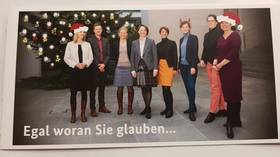Germany mulls ‘Mosque tax’ to help distract Muslims from ‘foreign influence’

In a bid to curb a potentially radicalizing foreign influence on its Muslim residents, German lawmakers are considering a new “mosque tax,” intended to make Muslim communities self-reliant and under more control.
Many German mosques are sponsored and are de-facto controlled from abroad, leaving local authorities in the dark about what happens inside. Now, several MPs have come up with an idea that they call a “solution” for a problem that has become increasingly unnerving for Berlin in recent years.
The MPs’ proposal involves the introduction of a special tax to be paid by all practicing Muslims in Germany, which would then be redistributed by the state among all officially registered Islamic religious institutions. A similar tax already exists in Germany and some other European countries for Catholic and Evangelical Christians.
The initiative is aimed at helping “Islam in Germany free itself from the influence of foreign states and get a stronger domestic orientation,” Thorsten Frei, the deputy head of Chancellor Angela Merkel’s Christian Democratic Union (CDU) faction in the German Parliament, said, calling the proposed tax “an important step in that direction.”
Frei’s idea immediately received support from other members of the ruling Grand Coalition. “Independent financing” would make the communities congregating in mosques in Germany more “transparent,” Michael Frieser, a legal expert and a member of the Bavarian Christian Social Union – a long-time CDU ally, said. A prominent member of the Social Democratic Party, Burkhard Lischka, called the suggestion “worthy of discussion.”
Other suggestions voiced by MPs include legally obliging the imams preaching in Germany to upload their sermons on the internet uncut. “The mosques must be open and transparent,” said Frieser.
'Muslims who want to integrate into our society are part of our country, but Islam is not part of Germany' - leading coalition politician https://t.co/MKR7XdWI8w
— RT (@RT_com) 15 апреля 2018 г.
However, any potential legislation on that matter has a long way to go before it could be implemented. Any draft bill should be first discussed with the German states as it falls within their jurisdiction, Lischka explained. So far, no detailed account of the future legislation has been presented.
Still, the idea also seemingly received backing from the Interior Ministry, which said “it can be a solution.” However, the ministry also said that the initiative would mostly rely on grassroots support from the Muslim communities themselves as it would still require a great deal of self-organization on their part.
New book highly critical of Islam & Muslims flying off the shelves in #Germanyhttps://t.co/tspV4L8ZMI
— RT (@RT_com) 15 сентября 2018 г.
The German Muslim community has so far remained conspicuously tight-lipped about the initiative. An outspoken unorthodox female preacher, Seyran Ates, founder of the first “liberal” mosque in Berlin, has been the only one to comment on the initiative so far. Ates backed the proposal by saying that “in the future everything that the community needs could be paid-for by its members themselves.”
For now, most Muslim religious institutions in Germany rely on foreign aid in some form. The Turkish-Islamic Union for Religious Affairs (DITIB), directly controlled by Ankara, is considered to be one of the largest organizations contributing to German mosques as it exerts influence over 896 Muslim communities across the country. Turkish President Recep Tayyip Erdogan personally opened one of the newly built mosques in the German city of Cologne during his visit in September.
DITIB might be one of the most influential Muslim organizations in Germany but the authorities are apparently more concerned about some other forces, which also seek to gain influence over German Muslims and which are much more radical. In 2017, German security forces warned that extremists from the Muslim Brotherhood –a radical Salafist organization established in 1928– were seeking to gain a “monopoly” over mosques in the eastern German state of Saxony and were even planning to “establish Sharia law in Germany.”
Also on rt.com Muslim Brotherhood expands presence in Germany, seeks to establish Sharia law – security officialEarlier reports in the German media also suggested that Islamic religious groups from Gulf States such as Kuwait, Qatar and Saudi Arabia are supporting the radical Salafist movement in Germany with the suspected approval of their governments. The activities of the foreign-funded Islamic NGOs have caught the attention of the German authorities following the 2015 refugee crisis, as Berlin grew increasingly concerned that their actions would lead to further radicalization of German Muslims as well as refugees, who arrived there in large numbers.
READ MORE: Islamist radicals in Germany backed by Saudi Arabia, Kuwait & Qatar – German media
The German domestic intelligence service, the BfV, has also warned that the Salafist movement became one of the most rapidly growing extremist groups in Germany. In late 2017, the then-head of the agency, Hans-Georg Maassen, said that there is now a record number of Islamists in Germany, putting their number at roughly 11,000.
In January 2018, a report by the BfV said that the number of Islamists in Berlin has more than doubled since 2011 and is steadily rising as 100 new followers joined local Salafist groups since the spring of 2017.
Think your friends would be interested? Share this story!















